优品课件之新版人教版八年级英语下册第一单元重点知识点汇总
人教版英语八年级下册Unit1知识点归纳
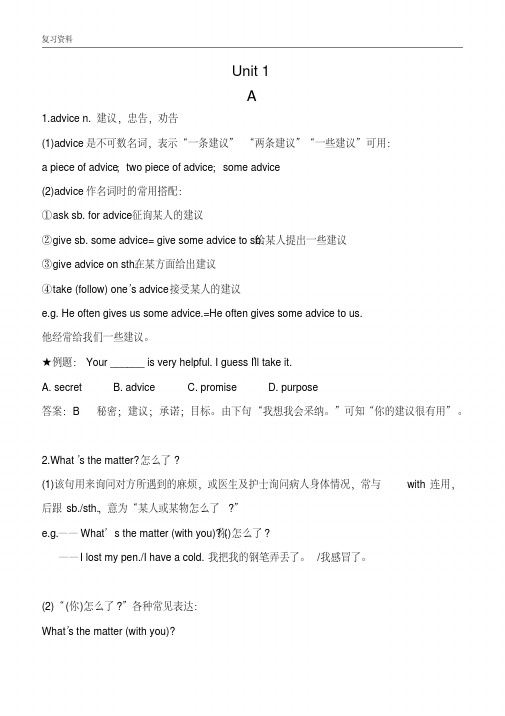
Unit 1A1.advice n. 建议,忠告,劝告(1)advice是不可数名词,表示“一条建议”“两条建议”“一些建议”可用:a piece of advice;two piece of advice;some advice(2)advice作名词时的常用搭配:①ask sb. for advice征询某人的建议②give sb. some advice= give some advice to sb.给某人提出一些建议③give advice on sth.在某方面给出建议④take (follow) one’s advice接受某人的建议e.g. He often gives us some advice.=He often gives some advice to us.他经常给我们一些建议。
★例题:Your ______ is very helpful. I guess I’ll take it.A. secretB. adviceC. promiseD. purpose答案:B 秘密;建议;承诺;目标。
由下句“我想我会采纳。
”可知“你的建议很有用”。
2.What’s the matter?怎么了?(1)该句用来询问对方所遇到的麻烦,或医生及护士询问病人身体情况,常与with连用,后跟sb./sth.,意为“某人或某物怎么了?”e.g.——What’s the matter (with you)? (你)怎么了?——I lost my pen./I have a cold. 我把我的钢笔弄丢了。
/我感冒了。
(2)“(你)怎么了?”各种常见表达:What’s the matter (with you)?=What’s the trouble (with you)?=What’s the problem(with you)?=What’s wrong (with you)?=What’s up?=What happened?★例题:——Nick is not at school. _______?——He has a cold.A. Who’s thatB. What’s the matterC. How old is heD. How much is it答案:B 句意:——Nick没来上学。
人教版八年级英语下册第一单元知识点总结
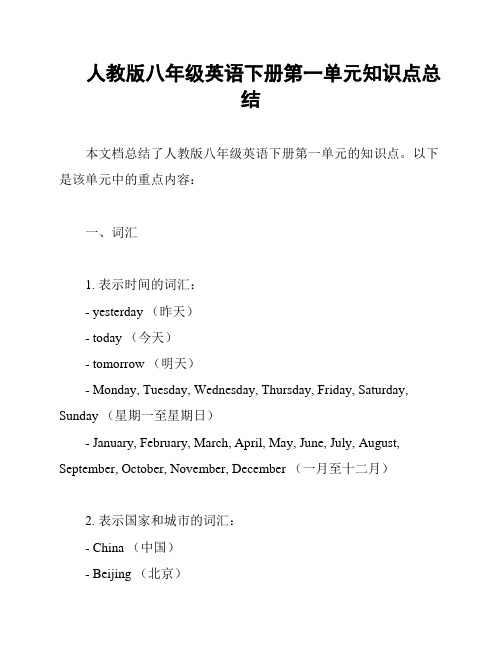
人教版八年级英语下册第一单元知识点总结本文档总结了人教版八年级英语下册第一单元的知识点。
以下是该单元中的重点内容:一、词汇1. 表示时间的词汇:- yesterday (昨天)- today (今天)- tomorrow (明天)- Monday, Tuesday, Wednesday, Thursday, Friday, Saturday, Sunday (星期一至星期日)- January, February, March, April, May, June, July, August, September, October, November, December (一月至十二月)2. 表示国家和城市的词汇:- China (中国)- Beijing (北京)- London (伦敦)- Tokyo (东京)- Sydney (悉尼)3. 数字词汇:- zero (零)- one (一)- two (二)- three (三)- four (四)- five (五)- six (六)- seven (七)- eight (八)- nine (九)- ten (十)二、语法1. 一般现在时的用法:- 表示经常性动作或惯性动作。
- 表示客观真理或科学事实。
- 使用动词的原形。
- 表示第三人称单数时,需在动词后加-s 或 -es。
2. 一般过去时的用法:- 表示过去某个时间发生的动作。
- 使用动词的过去式。
- 表示第三人称单数时,需在动词后加-ed 或 -ied。
三、会话和句子1. 日常交际用语:- How are you? (你好吗?)- I'm fine, thank you. (我很好,谢谢。
)- Where are you from? (你来自哪里?)- I'm from China. (我来自中国。
)- What's your name? (你叫什么名字?)- My name is Tom. (我叫汤姆。
新人教版八年级英语下册第一单元知识点
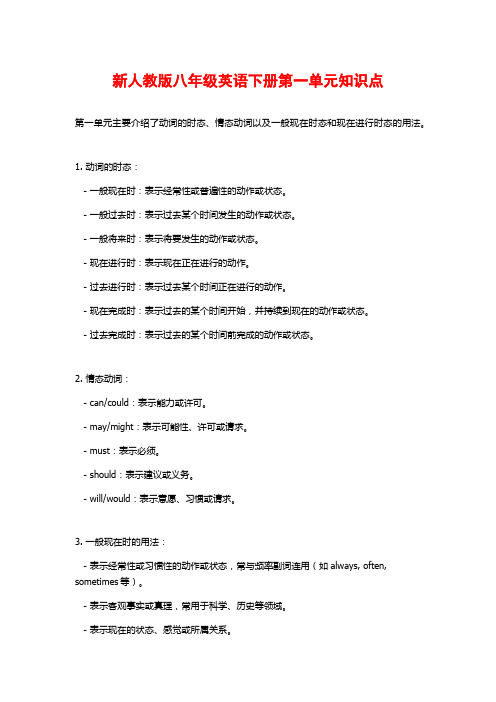
新人教版八年级英语下册第一单元知识点
第一单元主要介绍了动词的时态、情态动词以及一般现在时态和现在进行时态的用法。
1. 动词的时态:
- 一般现在时:表示经常性或普遍性的动作或状态。
- 一般过去时:表示过去某个时间发生的动作或状态。
- 一般将来时:表示将要发生的动作或状态。
- 现在进行时:表示现在正在进行的动作。
- 过去进行时:表示过去某个时间正在进行的动作。
- 现在完成时:表示过去的某个时间开始,并持续到现在的动作或状态。
- 过去完成时:表示过去的某个时间前完成的动作或状态。
2. 情态动词:
- can/could:表示能力或许可。
- may/might:表示可能性、许可或请求。
- must:表示必须。
- should:表示建议或义务。
- will/would:表示意愿、习惯或请求。
3. 一般现在时的用法:
- 表示经常性或习惯性的动作或状态,常与频率副词连用(如always, often, sometimes等)。
- 表示客观事实或真理,常用于科学、历史等领域。
- 表示现在的状态、感觉或所属关系。
4. 现在进行时的用法:
- 表示现阶段正在进行的动作或临时状态。
- 表示计划或安排的未来动作。
- 与always或often连用,表示经常性的不满或抱怨。
以上是第一单元的知识点,希望对你有帮助。
(完整版)新版人教版八年级英语下册第一单元重点知识点汇总
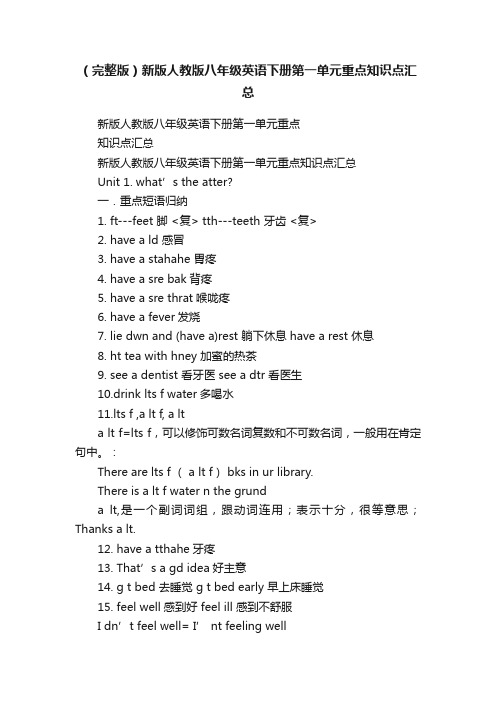
(完整版)新版人教版八年级英语下册第一单元重点知识点汇总新版人教版八年级英语下册第一单元重点知识点汇总新版人教版八年级英语下册第一单元重点知识点汇总Unit 1. what’s the atter?一.重点短语归纳1. ft---feet 脚 <复> tth---teeth 牙齿 <复>2. have a ld 感冒3. have a stahahe 胃疼4. have a sre bak背疼5. have a sre thrat喉咙疼6. have a fever发烧7. lie dwn and (have a)rest 躺下休息 have a rest 休息8. ht tea with hney 加蜜的热茶9. see a dentist 看牙医 see a dtr 看医生10.drink lts f water多喝水11.lts f ,a lt f, a lta lt f=lts f,可以修饰可数名词复数和不可数名词,一般用在肯定句中。
:There are lts f ( a lt f) bks in ur library.There is a lt f water n the grunda lt,是一个副词词组,跟动词连用;表示十分,很等意思;Thanks a lt.12. have a tthahe牙疼13. That’s a gd idea好主意14. g t bed 去睡觉 g t bed early 早上床睡觉15. feel well感到好 feel ill 感到不舒服I dn’t feel well=I’ nt feeling well我感觉不舒服.16. start ding/ t d sth开始做某事T D 是一件事情完成了,开始做另外一件事情DING是原的那件事情做到一半,现在又开始做了,是同一件事情。
17. tw days ag两天前18. get se rest 多休息, 休息一会儿19. I think s我认为是这样20. be thirsty口渴21. be hungry 饥饿22. be stressed ut紧张23. listen t usi听音乐24. healthy lifestyle健康的生活方式25. traditinal hinese dtrs传统中医26. need t d sth 需要做某事I have a tthahe. I need t see a dentist. 我牙痛, 我需要去看牙医.e need t keep ur lassr lean. 我们需要保持教室的干净.27. a balane f yin and yang阴阳平衡28. fr exaple例如29. t uh yin太多的阴, 阴气太盛t uh + 不可数名词太多的…uh t +形/副实在太…极其,非常t any + 可数名词复数太多的…30.be gd fr sth./ ding sth. 对什么有益,对什么有好处be bad fr sth./ ding sth. 对什么有害be gd t 对…好be gd at =d well in 在……方面好,擅长be gd(bad) fr、be gd at的相关用法1.be gd fr 对......有益Ding rning exerises is gd fr yur health.做早操对你们的建康有益。
人教版八年级英语下册第一单元知识点归纳总结
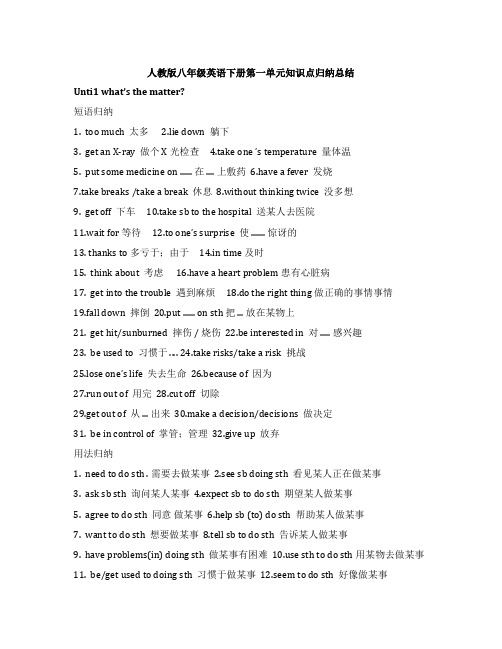
人教版八年级英语下册第一单元知识点归纳总结Unti1 what’s the matter?短语归纳1. too much 太多2.lie down 躺下3. get an X-ray 做个 X 光检查4.take one ’s temperature 量体温5. put some medicine on ...... 在 .... 上敷药6.have a fever 发烧7.take breaks /take a break 休息 8.without thinking twice 没多想9. get off 下车 10.take sb to the hospital 送某人去医院11.wait for 等待12.to one’s surprise 使 ....... 惊讶的13. thanks to 多亏于;由于 14.in time 及时15. think about 考虑 16.have a heart problem 患有心脏病17. get into the trouble 遇到麻烦 18.do the right thing 做正确的事情事情19.fall down 摔倒 20.put ...... on sth 把 ... 放在某物上21. get hit/sunburned 摔伤 / 烧伤 22.be interested in 对 ..... 感兴趣23. be used to 习惯于 .... 24.take risks/take a risk 挑战25.lose one’s life 失去生命 26.because of 因为27.run out of 用完 28.cut off 切除29.get out of 从 ... 出来 30.make a decision/decisions 做决定31. be in control of 掌管;管理 32.give up 放弃用法归纳1. need to do sth . 需要去做某事2.see sb doing sth 看见某人正在做某事3. ask sb sth 询问某人某事4.expect sb to do sth 期望某人做某事5. agree to do sth 同意做某事6.help sb (to) do sth 帮助某人做某事7. want to do sth 想要做某事 8.tell sb to do sth 告诉某人做某事9. have problems(in) doing sth 做某事有困难 e sth to do sth 用某物去做某事11. be/get used to doing sth 习惯于做某事 12.seem to do sth 好像做某事13. keep on doing sth 继续做某事 14.mind doing sth 介意做某事语法点1. 询问某人的健康问题及遇到麻烦的表达方法2. 情态动词 should 的用法3. 不定代词的用法精细解读1. What’s the matter (with you)? 怎么了?出什么事了?What’s the trouble/ the problem / wrong with sb./ sth. ?2. I had a cold. 我感冒了。
最新人教版八年级下册英语第一单元知识点
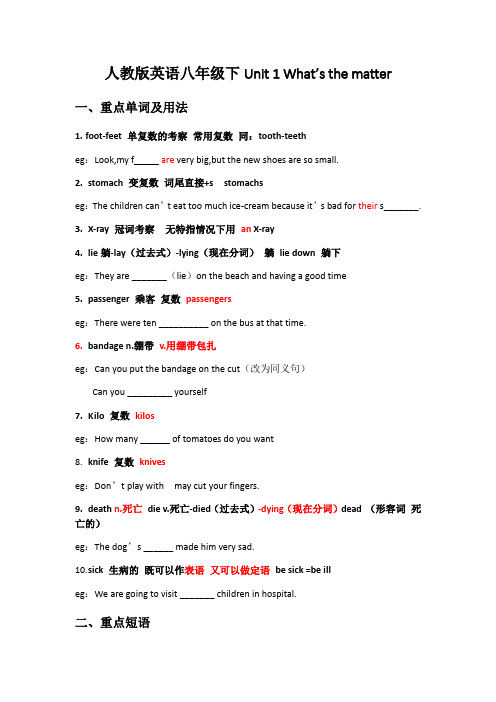
人教版英语八年级下Unit 1 What’s the matter一、重点单词及用法1.foot-feet 单复数的考察常用复数同:tooth-teetheg:Look,my f_____ are very big,but the new shoes are so small.2.stomach 变复数词尾直接+s stomachseg:The children can’t eat too much ice-cream because it’s bad for their s_______.3.X-ray 冠词考察无特指情况下用an X-ray4.lie躺-lay(过去式)-lying(现在分词)躺lie down 躺下eg:They are _______(lie)on the beach and having a good time5.passenger 乘客复数passengerseg:There were ten __________ on the bus at that time.6.bandage n.绷带v.用绷带包扎eg:Can you put the bandage on the cut(改为同义句)Can you _________ yourself7.Kilo 复数kiloseg:How many ______ of tomatoes do you want8.knife 复数kniveseg:Don’t play with may cut your fingers.9.death n.死亡die v.死亡-died(过去式)-dying(现在分词)dead (形容词死亡的)eg:The dog’s ______ made him very sad.10.s ick 生病的既可以作表语又可以做定语be sick =be illeg:We are going to visit _______ children in hospital.二、重点短语have a cold =catch a cold =have the flu 感冒cough 咳嗽lie down 躺下take one’s temperature 量体温have a fever 发烧take/have breaks/a break 休息=take/have a rest get off 下车-get on上车to one’s surprise 令某人惊讶的是right away 立刻马上=right now get into (trouble)陷入(麻烦)get sunburned 被晒伤be used to (doing)习惯于适应于...... take risks/a risk 去冒险run out (of)用完用尽cut off 切除get out of 离开从......出来be in control of 掌管管理give up (doing)放弃(做)某事have a stomachache 胃痛get an X-ray 做一个X射线检查thanks to......由于多亏in time 及时on time 准时think about 考虑think of认为fall down 摔倒make a decision 作决定put......on......把....放在...上be interested in 对...感兴趣三、用法总结1.need to do sth需要做某事eg: The teacher needs_____(rest) for a few minutes.like 意为“听起来像”后接n./adj./句子eg: It sounds like a good idea.类似的感官动词+like:feel like/smell like/ look like/taste like/seem likesound+adj. 结构中,sound 是系动词意为“听起来是”后接形容词eg:That sounds great.+n./doing(v.现在分词)He went to school without having breakfast. eg:He left the classroom without ________ anythingv.同意,赞成agree with sb/某人的意见看法Does she agree with usagree to do sth 同意做某事They agreed to solve the problem. problems (in) doing sth做某事有困难=have trouble/difficulty (in) doinghave problems with sth =have trouble/difficulty with sth 在某方面有困难eg:One of my good friends said he had problems__________(learn) English.get used to doing sth 习惯于做某事eg:He used to get up late,but now he is used to getting up early.used to do sth 过去常常做某事(现在不做了)eg:He used to read English in the evening.use sth to do sth 使用用某物做某事eg:So he used knife to cut off his arm.be used to do sth 被动被用于做某事eg:These new pens are used to paint the wall.one’s life 丧失生命save one’s life 挽救某人的生命eg:He lost his life in the car accident.adj.足够的充足的后接名词n. enough moneyadv.足够地修饰形容词/副词enough要后置eg:The book is_______,but I don’t have enough money ______it.interesting; to buy enough; to buyenough; buying interesting; buying9. the importance of (doing)sth (做)某事的重要性important adj.重要的unimportant adj.不重要的importance n.重要性eg:We students should know the importance of (learning)English.n.决定make a decision (to do sth)decide to do sth 决定做某事decide not to do sth 决定不做某事eg:Tom made a decision to study English well.up 放弃give up 是动词+副词结构接代词作宾语时代词放中间eg:The problem is so difficult for you,but don’t _______A.give it up it out up it out itgive up doing sth 放弃做某事eg:You will be very sad if you give up______(sing).用法keep on doing sth 继续做某事(中间有间隔强调重复性)eg:He kept on studying though he was very tired.keep doing sth 继续不停地做某事(不间断连续性)eg:Keep walking until you reach the end of the road.keep sb doing 让某人一直做某事eg:Don’t keep the other students waiting.keep sb from doing sth 阻止某人做某事eg:We should keep the little boy from stepping on the grass.用法find找到,强调寻找的结果look for强调寻找过程find out找出查明eg:I was looking for my watch,but I didn’t find it.find sb doing sth 发现某人正在做某事eg:When I walked along the road,I found an old man shouting for help.find it +adj形容词+to do sth 发现做某事是...的eg:She found it hard to finish the work by herself.risks=take a risk 冒险He likes taking risks.risk one’s life to do 冒着生命危险去做某事eg:He risked his life to save the child.risk doing stheg: The man called Tom often risks flying over the sea.四、短语辨析1.see sb doing sth 看见某人正在做某事(动作正在发生)see sb do sth 看见某人做某事(看到动作全过程或者经常看到动作发生)eg:I saw the boy crying when I passed by(路过).类似的hear/watch/notice/find+sb do/doing sththanks to 多亏... 由于....=with the help of/with one’s help=because ofthanks for 因.......而感谢强调感谢的原因eg:Thanks to my teacher ,I passed the exam.Thanks for your help .Thanks for inviting me.2.in time 及时表示动作在规定时间内或比规定时间提前发生on time 准时按时指正好在规定时间内eg:Thanks for coming here to help me in time.The train arrived into the station on time.火车准时进站了。
新人教版八年级下册英语第一单元短语和知识点总结ppt课件
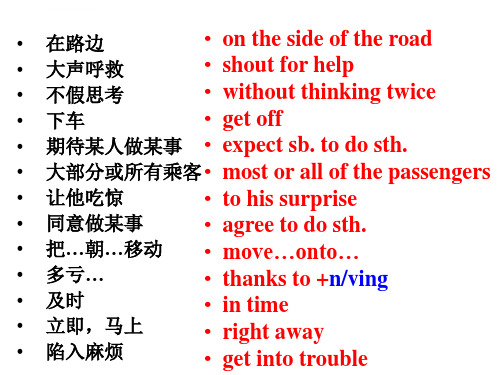
--- 他伤着了自己,他背疼。
He has a sore ห้องสมุดไป่ตู้ack.
--- 他应该躺下来休息。
He should lie down and rest.
hurt oneself: 伤到自己;hurt-hurt-hurt
采用PP管及配件:根据给水设计图配 置好PP管及配 件,用 管件在 管材垂 直角切 断管材 ,边剪 边旋转 ,以保 证切口 面的圆 度,保 持熔接 部位干 净无污 物
20.休息
• 19. get an X-ray
21.以同样的方式• 20. take breaks/ take a break
• 21. in the same way
采用PP管及配件:根据给水设计图配 置好PP管及配 件,用 管件在 管材垂 直角切 断管材 ,边剪 边旋转 ,以保 证切口 面的圆 度,保 持熔接 部位干 净无污 物
3.---你发烧了吗?
Do you have a fever?
--- 是的,我发烧了。
Yes, I do. / No, I don’t. /
/不,我没发烧。 /我不知道。
I don’t know.
4. ---他牙疼吗? • --- 是的,他牙疼。 • ---他应该去看牙医并且拍一个X片子。
Does he have a toothache? Yes, he does. He should see a dentist and get an X-ray.
very well.
4. My cat can find food by _i_ts_e_l_f .
采用PP管及配件:根据给水设计图配 置好PP管及配 件,用 管件在 管材垂 直角切 断管材 ,边剪 边旋转 ,以保 证切口 面的圆 度,保 持熔接 部位干 净无污 物
人教版八年级英语下册Unit 1知识点

人教版八年级英语下册Unit 1知识点人教版八年级英语下册Unit1知识点
Unit1illpeplehaverbts?
重点语法:一般将来时态的应用
d/des的一般将来时态形式:(shall/ill)d
d/des的一般将来时态的被动语态:(shall/ill)bedne 一般将来时态的肯定句、否定句、疑问句形式:
肯定句例句:Pepleillhaverbtsinafeears
否定句例句:Peple(illnt/n't)haverbtsinafeears 一般疑问句例句:illpeplehaverbtsinafeears?
特殊疑问句例句:hatillpeplehaveinafeears?
重点短语:n't=illnt
the'll=theill
she'll=sheill
he'll=heill
I'll=Iill
fallinlveith(sb/sth)爱上(某人/某物)
beabletdsth能够做某事
etrue实现
inthefuture未来
hundredsf数以百计的
thusandsf数以千计的
lfr(sb/sth)寻找(某人/某物)
ill→uld情态动词ill的原形和过去式
a→ight情态动词a的原形和过去式
ReadingStrateg(阅读方法)
Latthetitleandpiture,andpredithatuillreadabut (看着标题和图片,预知你要阅读那些方面的内容。
)Thishelpsugetreadtaquireneinfratin(这样可以帮助你获得一些新的信息。
)。
最全面人教版八年级下册英语第一单元知识点归纳总结

Unit 1 What's the matter?一、词汇与短语◆重点单词A部分1.matter n. 问题;事情2.sore adj. 疼痛的;酸痛的3.stomachache n. 胃痛;腹痛4.foot n. 脚;足5.neck n. 颈;脖子6.stomach n. 胃;腹部7.throat n. 咽喉;喉咙8.hurt v. (使)疼痛;受伤9.fever n. 发烧10.passenger n. 乘客;旅客11.lie v. 躺;平躺12.break n. 间歇;休息13.rest v. &n. 放松;休息14.onto prep. 向;朝15.X-ray n. X射线;X光16.trouble n. 问题;苦恼17.toothache n. 牙痛18.hit n. (用手或器具)击;打19.headache n. 头痛20.herself pron. (she的反身代词)她自己21.off adv. & prep. 离开(某处);不工作;从……去掉B部分1.bandage n. 绷带v. 用绷带包扎2.press v. 压;挤;按3.sick adj. 生病的;有病的4.knee n. 膝;膝盖5.breathe v. 呼吸6.knife n. 刀7.sunburned adj. 晒伤的8.blood n. 血9.ourselves pron. (we反身代词)我们自己10.mean v. 意思是;打算11.climber n. 登山者;攀登者12.importance n. 重要性;重要13.risk n.&v. 危险;风险;冒险14.decision n. 决定;抉择15.accident n.(交通)事故;意外遭遇16.control v.&n. 限制;约束;管理17.situation n. 情况;状况18.spirit n. 勇气;意志19.kilo( = kilogram) n. 千克;公斤20.death n. 死;死亡21.rock n. 岩石22.nurse n. 护士◆重点短语A部分1.have a cold 感冒2.lie down 躺下3.have a stomachache 胃痛4.take one's temperature 量体温5.have a fever 发烧6.to one's surprise 使……惊讶的是7.get off 下车8.right away 立即;马上9.take breaks (take a break) 休息10.talk too much 说得太多11.drink enough water 喝足够的水12.have a very sore throat 嗓子非常疼13.get an X-ray 拍X光片14.see a dentist 看牙医15.drink some hot tea with honey 喝一些加蜂蜜的热茶16.put some medicine on sth.在……上面敷一些药17.feel very hot 感到很热18.sound like 听起来像19.all weekend 整个周末20.in the same way 以同样的方式21.go to a doctor 看医生22.go along 沿着……走23.on the side of the road 在马路边24.shout for help 大声呼救25.without thinking twice 没有多想26.have a heart problem 有心脏病27.thanks to 多亏了;由于28.in time 及时29.save a life 挽救生命30.get into trouble 陷入麻烦31.hurt oneself 受伤32.fall down落下;摔倒B部分1.be used to 习惯于……;适应于……2.in a difficult situation 在困境中3.take risks (take a risk) 冒险4.keep on doing sth. 继续(或坚持)做某事5.run out (of) 用尽;耗尽6.make a decision 作出决定7.cut off 切除8.get hit on the head 撞到头部9.get out of 离开;从……岀来10.be interested in 对……感兴趣11.give up 放弃12.mean doing sth. 意味着做某事13.put a bandage on sth. 用绷带包扎…14.lose one's life 失去生命15.feel sick 感到恶心16.mountain climbing 登山运动17.have problems breathing 呼吸困难18.be in control of 掌管;管理◆重点句子A部分1.What's the matter with you?=What's the trouble with you?=What's wrong with you?你怎么了?2.What should she do? 她该怎么办呢?3.Did you fall down? 你跌倒了吗?4.Should I take my temperature? 我应该量一下体温吗?5.I think I sat in the same way for too long without moving.我想我以同样的姿势一动不动地坐得太久了。
新人教版八年级英语下册unit1知识点

12. trouble问题,麻烦;be in trouble,make trouble,have trouble (in) doing sth. =have difficulties (in) doing sth。
13. right away=right now=at once,意为。
Unit 1 What’s the matter?知识点总结
一、基本知识点
1. What’s the matter (with you)?怎么了?出什么事了?
What’sthe trouble/ the problem / wrongwithsb./ sth.?
2. I had a cold.我感冒了。
hit sb. in the face/ eye/ stomach打某人的脸、眼睛、肚子,in用在所打较软的部位。
19.beused to sth./doing sth.习惯于、适应了……、做某事,强调状态;His grandpa was used to country life.
Mary is not used togettingup early in the morning.
much too
太
修饰形容词或副词
It’s much too cold in winter.
()Mr.Smith eats ______ food,so he’s _____ fat.
A.much too;too much B.too many;much too
C.too much;too much D.too much ;much too
8. sound like+名词代词和从句:It sounds like you don’t know the truth. It sounds like a good idea.
(完整版)人教版八年级英语下册Unit1知识点讲解(可编辑修改word版)

Unit 1 重点知识讲解Grammar一、情态动词(Modal Verbs)情态动词should 意为“应该,应当”,必须和后面的动词原形一起构成谓语,没有人称和数的变化。
用以表达职责和义务、提出劝告,而且表述的是自己的主观看法。
1.should 的句式结构2.s hould 的用法喜或在说话人看来是不可思议的。
二、其他表示建议的句型表示反射或强调的代词叫做反身代词。
反身代词是由第一人称、第二人称形容词性物主代词或第三人称代词的宾格形式,词尾加self 或selves 组成。
反身代词可译“本人”、“本身”,为加强语气,也常翻译为“亲自”、“自己”。
不定人称代词one ---- oneself.1、反身代词的分类2、反身代词的用法单词的用法Section A1.What’s the matter?怎么了?该句常用询问某人患了何种疾病或遇到了什么麻烦,其后用with 引出对象。
1). What’s the matter with sb.?=what’s wrong with sb.?=what’s the trouble/problem with sb.?=what’s one’s trouble/problem?e.g. What’s the matter with Tom?=what’s with Tom?=What’s the with Tom?=What’s Tom’s?2). matter, 名词,“问题,事情”e.g. We have important (matter) to discuss.我们有些重要的问题要讨论。
3). 动词,“要紧,关系重大”e.g. It dosen’t that you came late.2.I have a cold.我感冒了。
1).have/get/catch a cold “感冒,着凉”The old man a cold yesterday.那位老人昨天感冒了。
Unit1知识点归纳人教版英语八年级下册

第一单元单元语法点:一. 情态动词should的用法1. 含义:情态动词should意为“应当,应该”,后接动词原形,没有人称和数的变化,否定形式为shouldn’t。
2.1.用法:1)表劝告建议You should eat more vegetables and fruit. You shouldn’t eat too much junk food. 你应该多吃蔬菜和水果,不应该吃太多的垃圾食品。
2)表义务责任We should study hard. 我们应该努力学习。
3)表惊讶等感情I’m surprised that he should say so. 我很惊讶他竟然会这么说。
4)用于主语为第一人称的疑问句中,表示征询意见。
Should we tell her about it? 我们应该告诉她这件事吗?二.反身代词1.含义:表示反射或强调的代词叫做反身代词。
反身代词是由第一人称、第二人称形容词性物主代词或第三人称人称代词宾格形式,词尾加self或 selves组成。
反身代词可译为“本人”、“本身”,为加强语气,也常译为“亲自”、“自己”。
请见下表:3.反身代词的常用搭配:玩的高兴、过得愉快enjoy oneself穿衣服dress oneself自便、自用;自取所需help oneself (to)单独地、独自地by oneself细节知识点:1.What’s the matter? 怎么了?1)本句是常见的口语表达,意为“怎么了/出什么事了?”常用来询问某人患了何种疾病或遇到了什么麻烦,其后可接由介词with引出具体询问的对象。
--What’s the matter with Jenny? 珍妮怎么了?--She has a bad cold. 她得了重感冒。
同义句型:= What’s wrong with sb.?= What’s the trouble / problem with sb.?= What’s one’s trouble?= What’s up with sb.?= What happened to sb.?2)matter 名词,意为“问题;事件”。
(完整版)人教版八年级英语下册Unit1知识点讲解.doc
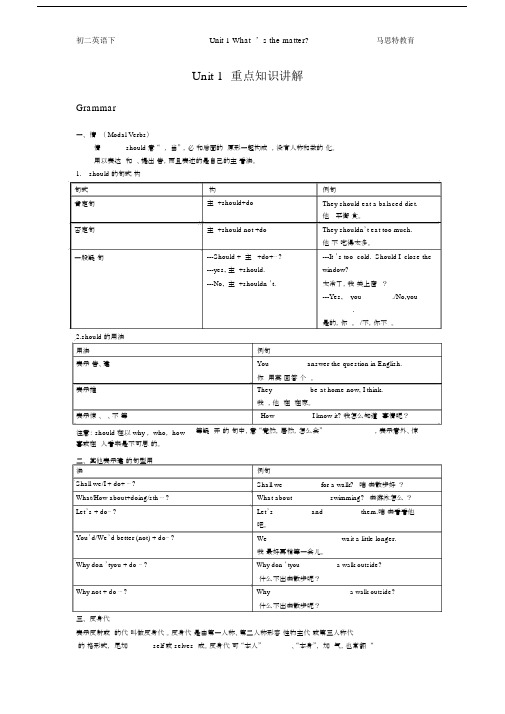
初二英语下Unit 1 What ’s the matter?马思特教育Unit 1 重点知识讲解Grammar一、情( Modal Verbs)情should 意“ ,当” ,必和后面的原形一起构成,没有人称和数的化。
用以表达和、提出告,而且表述的是自己的主看法。
1.should 的句式构句式构例句肯定句主 +should+do They should eat a balaced diet.他平衡食。
否定句主 +should not +do They shouldn’t eat too much.他不吃得太多。
一般疑句---Should + 主 +do+⋯ ? ---It ’s too cold. Should I close the---yes, 主 +should. window?---No, 主 +shouldn ’t. 太冷了,我关上窗?---Yes, you ______./No,you________.是的,你。
/不,你不。
2.should 的用法用法例句表示告、建You _________ answer the question in English.你用英回答个。
表示推表示惊、、不等注意: should 在以 why , who, how 喜或在人看来是不可思的。
二、其他表示建的句型用法Shall we/I + do+ ⋯ ?What/How about+doing/sth ⋯ ? Let’s + do⋯ ?You’d/We’d better (not) + do⋯ ?They _________ be at home now, I think.我,他在在家。
How _________ I know it? 我怎么知道事情呢?等疑开的句中,意“竟然,居然,怎么会”,表示意外、惊例句Shall we _________ for a walk?咱去散步好?What about _________ swimming?去游泳怎么?Let’s _________ and _________ them.咱去看看他吧。
(完整版)人教版八年级英语下册Unit1知识点讲解

Unit 1重点知识讲解Grammar一、情态动词(Modal Verbs)情态动词should意为“应该,应当”,必须和后面的动词原形一起构成谓语,没有人称和数的变化。
用以表达职责和义务、提出劝告,而且表述的是自己的主观看法。
喜或在说话人看来是不可思议的。
表示反射或强调的代词叫做反身代词。
反身代词是由第一人称、第二人称形容词性物主代词或第三人称代词的宾格形式,词尾加self或selves组成。
反身代词可译“本人”、“本身”,为加强语气,也常翻译为“亲自”、“自己”。
不定人称代词one-----oneself.单词的用法Section A1.What’s the matter?怎么了?该句常用询问某人患了何种疾病或遇到了什么麻烦,其后用with引出对象。
1). What’s the matter with sb.?=what’s wrong with sb.?=what’s the trouble/problem with sb.?=what’s one’s trouble/problem?e.g. What’s the matter with Tom?=what’s _________ with Tom?=What’s the _________ with Tom?=What’s Tom’s _________?2). matter, 名词,“问题,事情”e.g. We have important _________(matter) to discuss.我们有些重要的问题要讨论。
3). 动词,“要紧,关系重大”e.g. It dosen’t _________ that you came late.2.I have a cold.我感冒了。
1).have/get/catch a cold “感冒,着凉”The old man _________ a cold yesterday.那位老人昨天感冒了。
新人教版八年级下册英语第一单元重点归纳
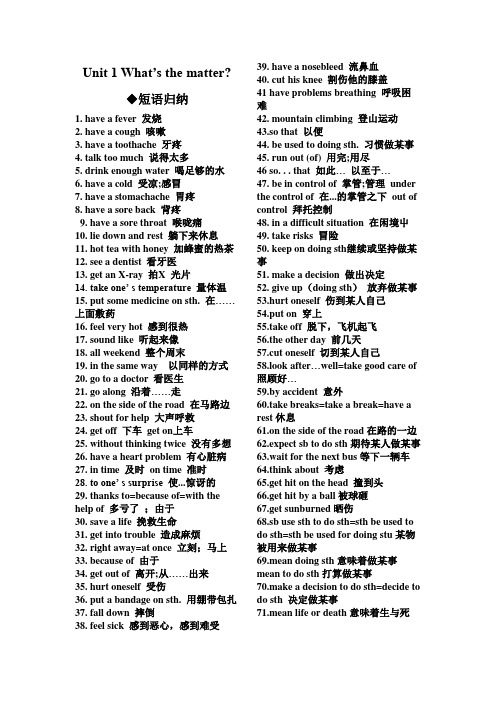
Unit 1 What’s the matter?◆短语归纳1. have a fever 发烧2. have a cough 咳嗽3. have a toothache 牙疼4. talk too much 说得太多5. drink enough water 喝足够的水6. have a cold 受凉;感冒7. have a stomachache 胃疼8. have a sore back 背疼9. have a sore throat 喉咙痛10. lie down and rest 躺下来休息11. hot tea with honey 加蜂蜜的热茶12. see a dentist 看牙医13. get an X-ray 拍X 光片14. take one’ s temperature 量体温15. put some medicine on sth. 在……上面敷药16. feel very hot 感到很热17. sound like 听起来像18. all weekend 整个周末19. in the same way 以同样的方式20. go to a doctor 看医生21. go along 沿着……走22. on the side of the road 在马路边23. shout for help 大声呼救24. get off 下车get on上车25. without thinking twice 没有多想26. have a heart problem 有心脏病27. in time 及时on time 准时28. to one’ s surprise 使...惊讶的29. thanks to=because of=with the help of 多亏了;由于30. save a life 挽救生命31. get into trouble 造成麻烦32. right away=at once 立刻;马上33. because of 由于34. get out of 离开;从……出来35. hurt oneself 受伤36. put a bandage on sth. 用绷带包扎37. fall down 摔倒38. feel sick 感到恶心,感到难受39. have a nosebleed 流鼻血40. cut his knee 割伤他的膝盖41 have problems breathing 呼吸困难42. mountain climbing 登山运动43.so that 以便44. be used to doing sth. 习惯做某事45. run out (of) 用完;用尽46 so. . . that 如此… 以至于…47. be in control of 掌管;管理under the control of 在...的掌管之下out of control 拜托控制48. in a difficult situation 在闲境屮49. take risks 冒险50. keep on doing sth继续或坚持做某事51. make a decision 做出决定52. give up(doing sth)放弃做某事53.hurt oneself 伤到某人自己54.put on 穿上55.take off 脱下,飞机起飞56.the other day 前几天57.cut oneself 切到某人自己58.look after…well=take good care of 照顾好…59.by accident 意外60.take breaks=take a break=have a rest休息61.on the side of the road在路的一边62.expect sb to do sth期待某人做某事63.wait for the next bus等下一辆车64.think about 考虑65.get hit on the head 撞到头66.get hit by a ball被球砸67.get sunburned晒伤68.sb use sth to do sth=sth be used to do sth=sth be used for doing stu某物被用来做某事69.mean doing sth意味着做某事mean to do sth打算做某事70.make a decision to do sth=decide to do sth 决定做某事71.mean life or death意味着生与死◆用法集萃1. What’ s the matter? 怎么啦?出什么事情了?matter n.问题;事情What’ s the matter with you?= What’s the trouble with you? = What’ s wrong with you?你怎么了?matter 和trouble 为名词,其前可加the 或形容词性物主代词,wrong 是adj. 不能加the用于询问某人有什么病或某人遇到什么麻烦、问题其后跟询问对象时,与介词with连用。
优品课件之八年级英语下册Unit 1知识讲解
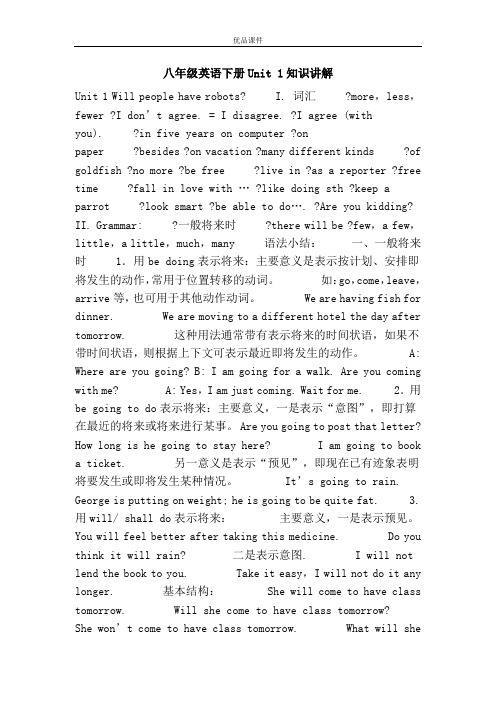
八年级英语下册Unit 1知识讲解Unit 1 Will people have robots? I. 词汇?more,less,fewer ?I don’t agree. = I disagree. ?I agree (withyou). ?in five years on computer ?onpaper ?besides ?on vacation ?many different kinds ?of goldfish ?no more ?be free ?live in ?as a reporter ?free time ?fall in love with … ?like doing sth ?keep a parrot ?look smart ?be able to do…. ?Are you kidding? II. Grammar: ?一般将来时?there will be ?few,a few,little,a little,much,many 语法小结:一、一般将来时1.用be doing表示将来:主要意义是表示按计划、安排即将发生的动作,常用于位置转移的动词。
如:go,come,leave,arrive等,也可用于其他动作动词。
We are having fish for dinner. We are moving to a different hotel the day after tomorrow. 这种用法通常带有表示将来的时间状语,如果不带时间状语,则根据上下文可表示最近即将发生的动作。
A: Where are you going? B: I am going for a walk. Are you coming with me? A: Yes,I am just coming. Wait for me. 2.用be going to do表示将来:主要意义,一是表示“意图”,即打算在最近的将来或将来进行某事。
优品课件之八年级下册英语第一单元单词表(新人教版)
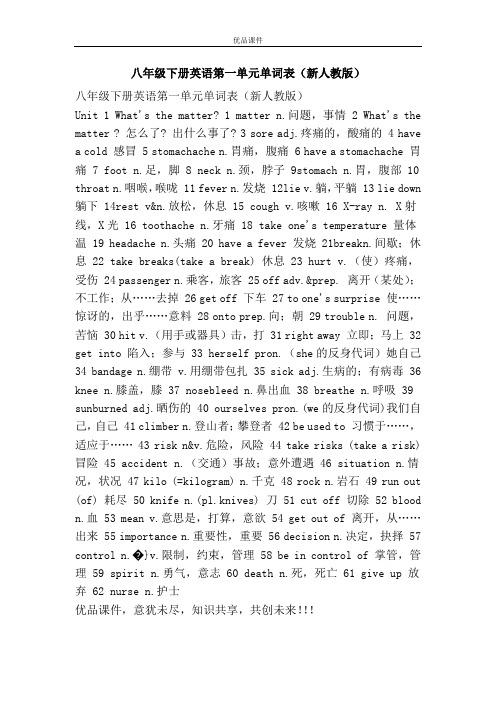
优品课件八年级下册英语第一单元单词表(新人教版)八年级下册英语第一单元单词表(新人教版)Unit 1 What's the matter? 1 matter n.问题,事情 2 What's the matter ? 怎么了? 出什么事了? 3 sore adj.疼痛的,酸痛的 4 have a cold 感冒 5 stomachache n.胃痛,腹痛 6 have a stomachache 胃痛 7 foot n.足,脚 8 neck n.颈,脖子 9stomach n.胃,腹部 10 throat n.咽喉,喉咙 11 fever n.发烧 12lie v.躺,平躺 13 lie down 躺下 14rest v&n.放松,休息 15 cough v.咳嗽 16 X-ray n. X射线,X光 16 toothache n.牙痛 18 take one's temperature 量体温 19 headache n.头痛 20 have a fever 发烧 21breakn.间歇;休息 22 take breaks(take a break) 休息 23 hurt v.(使)疼痛,受伤 24 passenger n.乘客,旅客 25 off adv.&prep. 离开(某处);不工作;从……去掉 26 get off 下车 27 to one's surprise 使……惊讶的,出乎……意料 28 onto prep.向;朝 29 trouble n. 问题,苦恼 30 hit v.(用手或器具)击,打 31 right away 立即;马上 32 get into 陷入;参与 33 herself pron.(she的反身代词)她自己34 bandage n.绷带 v.用绷带包扎 35 sick adj.生病的;有病毒 36 knee n.膝盖,膝 37 nosebleed n.鼻出血 38 breathe n.呼吸 39 sunburned adj.晒伤的 40 ourselves pron.(we的反身代词)我们自己,自己 41 climber n.登山者;攀登者 42 be used to 习惯于……,适应于…… 43 risk n&v.危险,风险 44 take risks (take a risk)冒险 45 accident n.(交通)事故;意外遭遇 46 situation n.情况,状况 47 kilo (=kilogram) n.千克 48 rock n.岩石 49 run out (of) 耗尽 50 knife n.(pl.knives) 刀 51 cut off 切除 52 blood n.血 53 mean v.意思是,打算,意欲 54 get out of 离开,从……出来 55 importance n.重要性,重要 56 decision n.决定,抉择 57 control n.�}v.限制,约束,管理 58 be in control of 掌管,管理 59 spirit n.勇气,意志 60 death n.死,死亡 61 give up 放弃 62 nurse n.护士优品课件,意犹未尽,知识共享,共创未来!!!。
新人教版八年级下册英语第一单元重点归纳

新人教版八年级下册英语第一单元重点归纳Unit 1 What’s the matter?In this unit。
we will learn some common phrases related to health and illness.1.Have a fever.If you have a fever。
your body temperature is higher than normal。
You may XXX.2.Have a cough.If you have a cough。
you make a noise when you XXX irritated.3.XXX.If you have a toothache。
one or more of your XXX.4.Talk too much.If you talk too much。
you speak more than necessary。
and it may make your throat sore.5.XXX XXX.It is XXX water to keep your body hydrated.6.Have a cold.If you have a cold。
you may have a XXX。
a sore throat。
and cough.7.XXX.If you have a XXX。
XXX hurts.8.Have a sore back.If you have a sore back。
your back hurts.9.Have XXX.If you have a sore throat。
XXX.10.Lie down and rest.If you lie down and rest。
you take a break from any physical activity and relax.11.XXX.XXX.12.XXX a dentist.If you have a toothache。
- 1、下载文档前请自行甄别文档内容的完整性,平台不提供额外的编辑、内容补充、找答案等附加服务。
- 2、"仅部分预览"的文档,不可在线预览部分如存在完整性等问题,可反馈申请退款(可完整预览的文档不适用该条件!)。
- 3、如文档侵犯您的权益,请联系客服反馈,我们会尽快为您处理(人工客服工作时间:9:00-18:30)。
新版人教版八年级英语下册第一单元重点知识点汇总新版人教版八年级英语下册第一单元重点知识点汇总Unit 1. what’s the matter?一.重点短语归纳1. foot---feet 脚 <复> tooth---teeth 牙齿 <复>2. have a cold 感冒3. have a stomachache 胃疼4. have a sore back背疼5. have a sore throat喉咙疼6. have a fever发烧7. lie down and (have a)rest 躺下休息 have a rest 休息8. hot tea with honey 加蜜的热茶9. see a dentist 看牙医 see a doctor 看医生10.drink lots of water多喝水11.lots of ,a lot of, a lota lot of=lots of,可以修饰可数名词复数和不可数名词,一般用在肯定句中。
:There are lots of ( a lot of) books in our library.There is a lot of water on the grounda lot,是一个副词词组,跟动词连用;表示十分,很等意思; Thanksa lot.12. have a toothache牙疼13. That’s a good idea好主意14. go to bed 去睡觉 go to bed early 早上床睡觉15. feel well感到好 feel ill 感到不舒服I don’t feel well= I’m not feeling well我感觉不舒服.16. start doing/ to do sth开始做某事TO DO 是一件事情完成了,开始做另外一件事情DOING是原来的那件事情做到一半,现在又开始做了,是同一件事情。
17. two days ago两天前18. get some rest 多休息, 休息一会儿19. I think so我认为是这样20. be thirsty口渴21. be hungry 饥饿22. be stressed out紧张23. listen to music听音乐24. healthy lifestyle健康的生活方式25. traditional Chinese doctors传统中医26. need to do sth 需要做某事I have a toothache. I need to see a dentist. 我牙痛, 我需要去看牙医.We need to keep our classroom clean. 我们需要保持教室的干净.27. a balance of yin and yang阴阳平衡28. for example例如29. too much yin太多的阴, 阴气太盛too much + 不可数名词太多的…much too +形/副实在太… 极其,非常too many + 可数名词复数太多的…30.be good for sth./ doing sth. 对什么有益,对什么有好处be bad for sth./ doing sth. 对什么有害be good to 对…好be good at =do well in 在……方面好,擅长be good(bad) for、be good at的相关用法1.be good for 对......有益Doing morning exercises is good for your health.做早操对你们的建康有益。
2.be good at 擅长于......Li Ping is good at basketball. 李平擅长于篮球。
= Li Ping is good at playing basketball. 李平擅长于打篮球。
be good at = do well in 如:I'm good at math. = I do well in math. 我擅长于数学。
3.be good to 对......好Parents are always good to their children.父母亲总是对他们的孩子好。
31.get good grades 取得好成绩32.angry 用法 be angry with sb生某人的气I was angry with him for keeping me waiting. 我对他很生气,因为他让我等了好久。
be angry at/ about sth 就某事生气33.Chinese medicine 中药34.be popular in + some place 在某地很流行Chinese medicine is now popular in many western countries. 现在中药在许多西方国家受欢迎。
35.in western countries在西方国家36.It’s easy to do sth做某事是容易的。
It’s important to do sth . 做某事很重要。
37.balanced diet平衡饮食38.get tired 感到疲倦 be/get tired39.go out at night在晚上出去When you are tired, you shouldn’t go out at night. 疲倦时,晚上你不该外出40.stay healthy 保持健康 =keep healthy=keep in good health41.at the moment此时,此刻= nowI’m not feeling very well at the moment42.enjoy sth. =like sth. (名词)喜欢某物,enjoy doing sth.喜欢做某事=like dong sthenjoy oneself (myself, yourself,herself, himself, themselves, ourselves, itself反身代词) 玩得高兴,过得愉快=have a good time = have a wonderful time =have fun43. conversation practice会话练习44. host family 寄宿家庭45. have a lot of headaches经常疼痛I’m tired and I have a lot of headaches. 我很疲劳,而且经常头痛。
46. a few + 可数名词复数少许…a little + 不可数名词/形/副一点…47.He shou ldn’t eat anything=He should eat nothing. 他不应当吃任何东西.48.give sb some advice给某人建议give advice 提出建议advice 是不可数名词a piece of advice 一则建议take one’s advice 采纳或听从某人的建议He gave me some good advice.他向我提了一些很好的意见。
49.sleep 8 hours a night每晚睡眠八小时50.take medicine 吃药服药I have to take medicine three times a day for my cold.因为感冒,我不得不一天吃三次药。
二固定结构It’s +形 + for sb. + to do sth.做某事对某人来说是…的。
It’s important to do sth .做某事很重要。
It’s important for me to eat a balanced diet. 平衡饮食对我来说是很重要的.It’s easy to do sth做某事是容易的。
It’s easy for us to find out the answer. 找出答案对我们来说是容易的三.重点句子1.What’s the matter ? What’s the mater with you ? 你怎么啦?=What’s the trouble with you?=What’s wrong with you?I have a cold / have a sore back / have a stomachache2.That’s too bad. You should / shouldn’t … 那太糟糕了. 你应该/不该…You should lie down and rest / drink hot tea with honey / see a dentist / see a doctor .He shouldn’t eat anything = He should eat nothing. 他不应当吃任何东西.3.I’m not felling well . 这里well表示身体状况,不能用good 代替I don’t feel well= I’m not fee ling well 我感觉不舒服.4.When did it start ? About two days ago . 什么时候开始的?大约两天前5.I hope you fell better soon . 我希望你很快好起来这里better是well的比较级6.Traditional Chinese doctors believe we need a balance of yin and yang to be healthy. 传统中医认为我们需要阴阳调和以保持身体健康。
这里 to be healthy是动词不定式短语,作目的状语7.You should eat hot yang foods, like beef. 你应该吃一些像牛肉之类的阳性食物。
8.Eating Dangshen and Huangqi herbs is also good for this. 吃党参和黄芪等草本植物也对这有好处。
9.People who are too stressed out and angry may have too much yang.太紧张易怒的人或许吃了太多的阳性食物。
too much后跟不可数名词,而too many后跟可数名词复数10.It’s easy to have a healthy lifestyle ,and it’s important to eat a balanced diet . 有一个健康的生活方式很容易,饮食平衡是很重要的。
